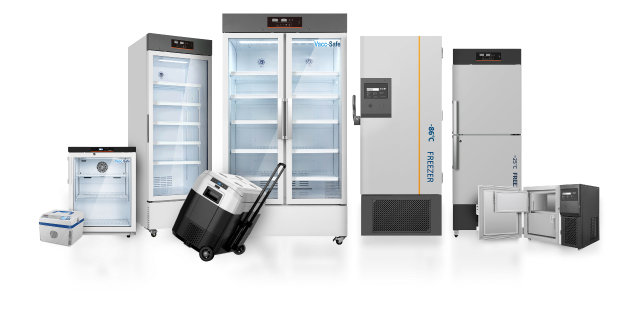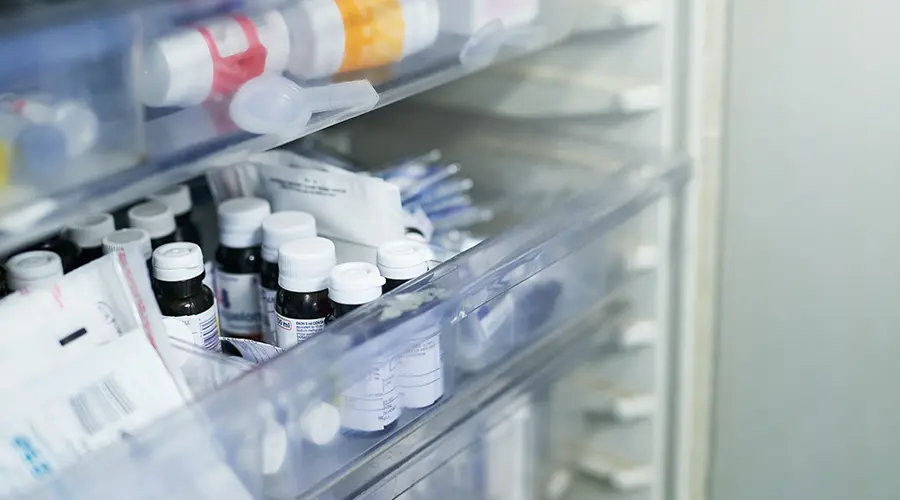
How to Arrange Vaccines in a Fridge
May 28, 2025Understanding the correct and safe way to store pharmacy medicine is an important part of pharmacy management. Proper medicine storage is imperative for medicine efficacy and longevity. Depending on the medicine and its requirements, pharmacies can store medicines in medical fridges, behind the counter, on shelves and in locked safes. In this article we will explain everything about pharmacy medicine storage, what it is, types of storage and how to store medicine in a pharmacy correctly.
Understanding the correct and safe way to store pharmacy medicine is an important part of pharmacy management. Proper medicine storage is imperative for medicine efficacy and longevity. Depending on the medicine and its requirements, pharmacies can store medicines in medical fridges, behind the counter, on shelves and in locked safes. In this article we will explain everything about pharmacy medicine storage, what it is, types of storage and how to store medicine in a pharmacy correctly.
Why is Proper Pharmacy Medicine Storage Important?
Medicine needs to be stored in specific conditions in a pharmacy to ensure its safety and efficacy. Many pharmacy medications are temperature sensitive and require specific temperatures to maintain their quality, potency and safety. When medicines are not stored properly in a pharmacy, they can become ineffective, unsafe and sometimes dangerous for patients. It is essential they are stored in a proper and secure environment for these reasons:
- To maintain medicine efficacy and prevent degradation: Medicines need to be stored in the right environment whether that is specific temperature control or protection from light and moisture. This helps to ensure they maintain efficacy and prevent degradation. When medicines degrade they lose potency and can become inefficient. This can lead to patients receiving medications that are not only useless but potentially unsafe. The lack of potency may mean patients fail to receive the proper dosage. In the worst case scenario, some medications stored incorrectly can actually become poisonous and dangerous to users.
- To ensure they are secure: Proper storage ensures medicines are kept in a safe and secure location that cannot be tampered with. Many storage options like medical fridges and locked safes have specific security measures to protect the sensitive nature of medicines and avoid theft, misuse or tampering.
- To adhere to legal requirements: Medicine has to be stored in adherence with legal requirements. The regulations were created to ensure public safety, prevent misuse, and maintain the efficacy of medications. Specific storage requirements vary depending on the medication’s scheduling and whether it requires temperature control. The prescribing, supply, storage and administration of medicines is regulated by legislation and jurisdictional requirements like the Therapeutic Goods Act 1989.
What Types of Medicines Need Storage?
There are a variety of medicines that require specific storage due to their specific needs for maintaining safety and efficacy. The below all need to meet specific storage requirements:
- Prescription medicines
- Vaccines
- Controlled medications
- Temperature sensitive drugs
- Controlled drugs
The storage requirements are different for every single medication, so it’s critical that you review the requirements per medication before storing. Generally however, over the counter medicines usually do not require refrigeration but still need to be stored in a cool, dry place. Vaccines usually always need to be stored in temperature control conditions of a medication fridge to keep them safe and viable. Controlled drugs like methadone and oxycodone all require highly secure storage like a locked safe to comply with regulations and avoid theft.
Types of Pharmacy Medicine Storage
There are two types of pharmacy medicine storage – shelf and cold storage. When medicines are stored on shelf storage it means they require a controlled room temperature while cold storage means strict temperature between 2°C to 8°C. Some medications require even colder temperatures such as freezers.
Shelf storage: Shelf storage in pharmacies is usually for medications that require a room temperature of between 15°C and 25°C. Capsules, tablets and some liquid medications need to be stored at a controlled room temperature but do not require cold storage. Shelving in pharmacies can be open, drawers or secure with lockable compartments and shelving to prevent unauthorised access of controlled medications.
Cold storage: In pharmacies, cold storage refers to using purpose built medical fridges that provide precise temperature regulation between 2°C and 8°C for the safekeeping of certain medications and vaccines. This process is also known as the cold chain which is a temperature controlled supply chain that ensures temperature sensitive medications and vaccines remain within the specific temperature range from manufacturing to administering.
Medical fridges are one of the essential pieces of equipment for a pharmacy. They are designed to comply with the National Vaccine Storage Guidelines and must be used in pharmacies to ensure temperature consistency between the required parameters. Medical fridges have additional features like alarms, data loggers and backup battery supply. Medical fridges come in a variety of types and sizes including essential, under bench, premium and portable.
General Principles of Pharmacy Medicine Storage
Proper storage of pharmacy medicine means ensuring that medicine is kept in the environment it requires. The Australian Commission on Safety and Quality in Healthcare has put together guidelines to address all aspects of medicine selection and storage that can affect the likelihood of medication error. The Therapeutics Goods Act 1989 also contains general storage requirements.
The general principles of pharmacy medicine storage mean that Schedule 8 (controlled drugs) must be kept in locked safes and Schedule 4 (prescription-only) medicines must be stored in the dispensary, inaccessible to the public. Temperature-sensitive medicines require dedicated refrigeration, and all storage areas should be clean, dry, and well-lit. The general principles and any additional considerations of pharmacy medicine storage are:
General principles
- Temperature control: Some medications require strict temperature controls to ensure they remain safe and viable for use. When medications are exposed to temperatures that are too hot or cold they can become ineffective and sometimes unsafe. In a pharmacy, temperature sensitive medications and vaccines must be stored in a purpose built medical fridge.
- Refrigerated medicines: Medications for weight loss, diabetes, cancer, and even some creams and gels must be refrigerated. Temperature-sensitive medicine must not be stored in a refrigerator unless it is a medical-grade fridge. Domestic fridges do not have the same temperature control as medical fridges.
- Room temperature: Some medications need to be stored at room temperature but this temperature still needs to be controlled between 15°C and 25°C for efficacy.
- The correct environment: The environment a medical fridge is positioned in must be on a level surface, away from direct sunlight, avoids temperature fluctuations and has the right ventilation.
- Transportation: The cold chain is the system of storing and transporting temperature sensitive medications and vaccines at recommended temperatures from the manufacturing right through the use. This means these medications and vaccines must be kept in temperatures between 2c and 8c at all times during transportation. If transporting medications yourself, a portable vaccine fridge would be necessary to ensure temperature compliance.
- Spill prevention: Proper storage and handling of medications includes spill prevention measures as spills can contaminate medicines and make them ineffective and even harmful. Vaccine storage boxes are specifically designed to store vaccine vials, which are essential to prevent any spillage. These boxes are strong and durable, usually measuring 900mm L x 900mm W x 40mm H and capable of storing up to 25 vials safely. Other additional spill prevention measures include labelling, secure storage containers, segregation of incompatible substances, and spill kits.
- Disposal: Disposal of unwanted or expired medicines is imperative for safety of patients. It can be done through programs like the Return Unwanted Medicines project. Pharmacists can dispose of medications through this program and it is also open to the public for safe disposal of their medications.
- Security: Medications must be kept in secure storage to prevent theft and misuse. This could be lockable storage like cabinets, rooms or safes. Lockable medical fridges are ideal as they have either digital locks or key locks to meet medical compliance and safety standards. Access to medicine storage should only be available to authorised personnel and keys must be managed securely.
- Inventory management: Inventory must be managed with proper documentation to prevent theft, loss or waste of medications. Management of inventory includes monitoring usage patterns and regular checks of stock rotation and expiry dates. To manage and monitor stock and supplies inside the fridge, adopt a first in first out system where the older supplies are used first. Manually note down when any medication or vaccine is removed from the refrigerator. To monitor the temperature range of the fridge and make sure it is within acceptable parameters, staff can manually check the temperature twice a day. Remote digital monitoring will also store the medical fridge temperature and alert to any discrepancies.
- Specific schedule requirements: Scheduling is a national classification system that controls how medications are made available to the public. They are classified into schedules to control their availability and use. The schedule determines how different medicines can be purchased, dispensed and used.
*Schedule 8 (controlled drugs): These controlled drugs are also known as drugs of addiction and are prescription only medications based on the potential for dependence and misuse. These drugs are highly regulated and include morphine, fentanyl, oxycodone, ketamine and MDMA. They have a high risk of addiction, dependence or overdose. Schedule 8 drugs must be stored in a lockable storage facility which is firmly attached to the floor or wall. Any schedule 8 drugs that require refrigeration must be stored in a lockable medical refrigerator within a secure room.
*Schedule 4 (prescription only medicine): These are prescription only medications that require a medical diagnosis to be prescribed. They may be medicines for conditions with symptoms that require professional diagnoses and monitoring but are not necessarily addictive. Schedule 4 drugs include amoxycillin, aspirin, celecoxib and cephalexin. Schedule 4 medicine must be stored in lockable cabinets or a secure room that can only be accessed by authorised personnel.
*Schedule 3 (pharmacist only): These medications do not require a prescription but professional advice is recommended. Schedule 3 medicines include cough mixtures, pain medications or medicine for allergies. Schedule 3 medications must be stored in a part of the pharmacy that is not accessible to the public like the dispensary or behind the counter.
Additional considerations
- Staff training: People in charge of storing or handling pharmacy medications should have the proper training. This includes safe handling, understanding the correct storage conditions, monitoring cold storage temperatures, and documentation procedures.
- Emergency procedures: There should be emergency procedures in place for medicine storage should an unexpected event occur. Cold storage, in particular, has guidance procedures in the event of a power outage. It’s essential in vaccine management and storage that you have an appropriate emergency power outage plan. The National Vaccine Storage Guidelines emphasise the importance of a plan in the event of cold chain breaches and emergency power outages.
Pharmacy medicine storage is an important part of pharmacy management. Medications and vaccines need to be kept in a particular environment, often with temperature controlled medical fridges. In this article, we have explained why proper medicine storage is important and general principles for pharmacy medicine storage. For further information contact the friendly team at Vaccsafe.









